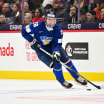Flyers prospects Cam York and Bobby Brink finished their respective junior careers in memorable fashion as they left the 2020 IIHF Under-20 World Championship (World Junior Championships) with gold medals around their necks. Meanwhile, Emil Andrae figures to play a bigger role in the 2021-22 tournament than he had this year.
Here's a quick synopsis of the three players' performances and a look at what could be in store for each over the remainder of the 2020-21 hockey season.
WJC Wrap Up: York and Brink Win Gold
A quick synopsis of the three players' performances and a look at what could be in store for each over the remainder of the 2020-21 hockey season

By
Bill Meltzer
philadelphiaflyers.com
CAM YORK
The Team USA captain and Flyers 2019 first-round pick got the ultimate present on his 20th birthday: a 2-0 gold medal victory for his team against a Team Canada squad that had been dominant throughout the tournament. The American team started slowly, losing its preliminary round opener to Russia and then got better with each successive game. The Americans saved the best for last with an A+ performance virtually teamwide against Canada.
York logged huge ice time for Team USA throughout the tourney, playing in every game situation. Offensively, he racked up six points (1g, 5a) through the first three games of the preliminary round and then did not record a point the remainder of the tourney. That really doesn't tell much of the story, however. Out of the seven games that Team USA played, York was easily the Americans' best all-around defenseman in five of them. Actually, when he was named Best Player in the opener against Russia because of a one-goal, one-assist showing, it wasn't even one of his better overall games.
York's precision passing, tape-to-tape breakout passes and power play setups where he'd perfectly tee up one-timer opportunities, stood out. So did his poise under pressure; as one example, in the gold medal game, he took a hit at the blue line, maintained possession and calmly passed the puck to set up a scoring chance a moment later.
The young defenseman didn't play a perfect tournament, by any means. He was beaten a time or two (such as on a Russia breakaway goal in the opener), and made a couple of ill-advised plays with the puck up top in the defensive zone or neutral zone that did not prove costly. That happens to every defenseman sometimes. The key is how they respond to it. Do they bounce right back or do the errors compound? York showed maturity in how well he responded.
In the Americans' 4-3 win over Finland in the medal round semifinal, things didn't go York's way. He was out for three goals against, although it would be unfair to single out York on the plays. Two were scored on plays where a USA forward failed to provide support and York was left alone to try to defend two attackers at once. The opponent he did not go to ended up being the goal scorer as well. The other goal against was a positional battle in the near slot where York's check got off a shot and the puck leaked in past USA goalie Spencer Knight.
How did York respond? With a stellar defensive performance in the gold medal game. He made two vital plays in the third period with the Americans defending a 2-on-1 lead. Most memorably, he broke up a two on-one with a perfectly timed drop to the ice and swatted the puck away with his stick. York's quick defensive stick was on display throughout the tourney, actually; not just in desperate situations but also numerous times where he broke up plays before they ever had a chance to turn dangerous.
Ordinarily while at the University of Michigan (and previously with the USNTDP and international under-18 squad), York is not shy at all about pulling the trigger when he has a shooting opportunity from the point or top of the circle. He doesn't have a booming shot but does have an accurate one that he releases quickly and gets the puck on net most of the time
At the WJC, whether it was a systems-based preference to get the puck to a forward in the bumper spot or the half wall or simply the sheer array of scoring talent surrounding him, York rarely elected to shoot when the puck came out to him on the power play. He almost always passed (and executed it well). Additionally, once he dished the puck, York rarely got it back except when Team USA had to reset. Low-to-high plays, and point shots looking for screens and high-tips, really weren't featured very frequently. York would shoot if it was the only option or if the lane was wide open, but his shot attempt volume at the WJC was lower than normal.
As such, York probably lost a couple potential points over the course of the latter part of the tourney. He was part of several puck-movement sequences that ended up in USA goals but where he wasn't one of the last two players to get touches before the puck came to the eventual goal-scorer's stick. Overall, York was a boon to the USA attack.
In general, York does not make a slew of spectacular-looking plays. Instead, he's efficient, hockey smart and precise. He can also play the game at any tempo that's necessary, as he displayed at the breakneck pace of lengthy segments of the gold medal game and portions of the Americans' New Year's Eve win against Sweden. These traits are vital to understanding why he is considered an NHL fast-track player.
York was selected as one of the three best players on Team USA by his coaches. The player's ice time spoke to the trust he'd earned. The captain's "C" on his chest spoke to the level of respect he had from the entire team. York isn't the most vocal of players, necessarily, but his preparation, physical fitness level, character and resilience set a lead that teammates couldn't help but follow.
Keep this in mind, too: York was part of an NHL Draft record-shattering USTNDP crop in the 2019 NHL Draft that saw an astounding 17 of its players drafted including six defensemen. The gold medal at the 2020-21 World Juniors was the crowning achievement for much of the nucleus of the group minus Jack Hughes, who is already in the NHL with New Jersey and did not participate in this year's WJC.
York's fellow Class of 2019 NTDP grads who were on the USA roster in Edmonton included Alex Turcotte, Trevor Zegras, Matthew Boldy, Cole Caufield, John Beecher, Patrick Moynihan, defensemen Drew Helleson and Henry Thrun as well as goaltender Knight. Several other Team USA players such as Brink and center John Farinacci also spent time with the USNTDP program in their Draft year and earlier but were not counted among the 17 draftees because they played primarily for other teams in 2018-19.
Among this extensive group of outstanding NHL prospects, it was York who was chosen to wear the C. Likewise, York is the lone defenseman from the gold medalists who played in both the 2019-20 and 2020-21 tourneys.
WHAT'S NEXT: The just-turned-20 York will return to the University of Michigan to complete his sophomore year. Team USA teammate Matthew Beniers, a forward, is also a teammate on the Wolverines. Their team needs both of them back in the lineup. York was off to a very strong start for the Wolverines prior to taking leave to join Team USA for the World Juniors. After this collegiate season, he may sign an entry-level contract and turn pro to join the Flyers.
BOBBY BRINK
Whenever Team USA needed a jolt of energy, they could rely on their third-line combination of Coyotes prospect Farinacci, Rangers 2020 5th round pick Brett Berard, and Flyers 2019 second-round pick Brink to supply it. The line forechecked tenaciously, made second-effort and third-effort plays and also stepped up offensively at key junctures.
Although generally among the smallest players on the ice, the 5-foot-8 Brink is absolutely fearless in going to the high-traffic areas and battling for the puck in all three zones. He is a slick playmaker and elusive in generating entries in the offensive zone. He is clever in his ability to shield, twist, turn and otherwise find space.
Brink is often maligned for his skating (which can be a fatal combination with a severe lack of size). While his skating isn't pretty, he usually seems to get where he needs to go. He finds the seams and has a knack for coming up with loose pucks and win battles against bigger players. That stems from the player's hockey IQ. He may not be fast, per se, but he's quick.
Brink recorded six points in the seven games (2g, 4a) with both goals coming in Team USA's preliminary round win over the Czech Republic. The first was a rebound goal, the latter was a re-direct in close. The two goals turned a scoreless game entering the second period in at 3-0 edge. The Americans went on to turn the game into a 7-0 rout. For his efforts, Brink was chosen Team USA's Best Player of the Game.
If anything, Brink was among the USA players who was a little unlucky in the goal department. He was robbed a few times, drew iron or narrowly missed the target on some of his best scoring opportunities. Nonetheless, Brink was part of the Americans' second power play unit; a testament to how deep the unit was. He also saw some early tournament shifts on his off-wing as well as the right side, as needed.
Brink's hustle, moxie and willingness to sacrifice himself for the good of the team was on full display throughout the tourney. In the gold medal game, Brink laid out and made a pair of clutch shot blocks in the defensive zone during the third period. He also got his fair share of gloves to the face from opponents (which he gave right back) because he'd keep digging and poking at the puck right up to the whistle.
Defensively, Brink makes a commendable effort. There were a few times in the WJC where he wasn't in the right spot or his man shook loose. He's at a physical disadvantage in certain matchups but he always competes and seems driven to continue to improve. Drive, skill and hockey smarts go a long way toward overcoming size drawbacks.
What's Next: Brink will return to the University of Denver, where the sophomore posted three assists through the Pioneers' first three games of the belated 2020-21 season. After the campaign, he will speak to his advisor and to the Flyers. Brink may play his junior year before turning pro (it seems unlikely he will play a senior year) or it's also possible that he and the Flyers could decide the time is right this calendar year to sign an entry-level contract and gain some experience with the Phantoms at the American Hockey League level. Eventually, he stands a good chance at pushing for an NHL spot.
EMIL ANDRAE
Andrae, the Flyers' 2020 second-round pick, played a fairly limited role for Team Sweden at this year's tournament but it was actually a more substantial role than York (who barely saw the ice a year ago) played for the Americans in 2019-20. Andrae's responsibilities figure to increase as a 19-year-old returnee next year. It would also not be surprising if the former under-18 national team captain is selected to wear a letter on his uniform next year.
Andrae entered this year's tournament cast in the thankless role as Sweden's No. 7 defensemen in the opener. He earned a slightly bigger role, moving up a notch, thereafter and at least seeing more overall shifts.
Arguably, Andrae's best all-around performance of the tournament came in Sweden's 4-0 win over Austria. He skated 21:17 over 26 shifts, handled the puck well, defended effectively on the few occasions where his team did not have puck possession (the Swedes outshot the Austrians by a staggering 65-6 margin for the game). Statistically, Andrae's most noteworthy outing came in the Swedes' 4-3 overtime loss to Russia (one assist, plus-two in 11:06 of ice time), but he was more of a force against the inferior Austrian team.
There were times during the tournament where Andrae was either a little too assertive (he got out of position on a Czech power play goal in the opener) or, at the opposite end, perhaps a bit more conservative than he will likely be as a returnee next year. It's all part of the learning curve. For a first-time WJC participant as an 18-year-old Andrae did fine for a team that wound up losing three games in a row and made a disappointed quarterfinal exit after failing to win a game where they led arch-rival Finland by a 2-0 score.
WHAT'S NEXT: Despite his tender age, Andrae is already a regular starter in the SHL -- Sweden's top pro league -- for HV71 Jönköping. As with his time with the Swedish national under-20 team this season, Andrae is gaining valuable experience and working his way toward a bigger role come next season. There is no rush for him or for the Flyers. The Flyers hold his signing rights until June 1, 2024, and the player can develop at his own pace in a good program and challenging league.


















